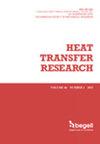Investigation of the Effect of Dead State Temperature on the Performance of Boron Added Fuels and Different Fuels Used in an Internal Combustion Engine.
IF 1.6
4区 工程技术
Q3 THERMODYNAMICS
引用次数: 0
Abstract
This study aimed to investigate the exergy variations of five different fuels developed for internal combustion engines. Two of these fuels were newly developed boron-added fuels. In many previous studies, only one dead state temperature was considered for exergy calculations. However, it is important to note that the dead state temperature can vary. Therefore, the impact of changing the dead state temperature on the exergy of the internal combustion engine becomes crucial. In this particular study, the exergy variations of the newly developed boron-additive fuels ES12.5 and MS12.5, as well as gasoline blended with ethanol (E12.5), gasoline blended with methane (M12.5), and pure gasoline (B100) were examined. These variations were analyzed at different dead state temperatures ranging from 273K to 298K. This study focused on examining the detailed changes in the exergy of exhaust gases emitted from the combustion process, specifically at the exhaust outlet, with respect to variations in the dead state temperature. Furthermore, the impact of the dead state temperature on various parameters commonly used in thermodynamic analyses, including Improvement potential, productivity lack, and fuel depletion ratio were investigated.. Through analysis, the study revealed significant variations in the exergy of internal combustion engines when the dead state temperature was altered. These findings emphasized the importance of considering the dead state temperature as a critical factor in understanding and optimizing the exergy performance of internal combustion engines.研究死态温度对内燃机中添加硼的燃料和不同燃料性能的影响。
这项研究旨在调查为内燃机开发的五种不同燃料的能耗变化。其中两种燃料是新开发的加硼燃料。在以前的许多研究中,计算放热量时只考虑一个死态温度。但必须注意的是,死态温度是可以变化的。因此,改变死态温度对内燃机能耗的影响变得至关重要。在这项研究中,研究了新开发的硼添加剂燃料 ES12.5 和 MS12.5,以及与乙醇混合的汽油(E12.5)、与甲烷混合的汽油(M12.5)和纯汽油(B100)的能量变化。本研究的重点是研究燃烧过程中排放的废气,特别是废气出口处废气的放热量随死态温度变化而发生的详细变化。此外,还研究了死态温度对热力学分析中常用的各种参数的影响,包括改进势能、生产率不足和燃料损耗比。通过分析,研究发现,当死态温度发生变化时,内燃机的放能会发生显著变化。这些发现强调了将死态温度视为了解和优化内燃机放能性能的关键因素的重要性。
本文章由计算机程序翻译,如有差异,请以英文原文为准。
求助全文
约1分钟内获得全文
求助全文
来源期刊

Heat Transfer Research
工程技术-热力学
CiteScore
3.10
自引率
23.50%
发文量
102
审稿时长
13.2 months
期刊介绍:
Heat Transfer Research (ISSN1064-2285) presents archived theoretical, applied, and experimental papers selected globally. Selected papers from technical conference proceedings and academic laboratory reports are also published. Papers are selected and reviewed by a group of expert associate editors, guided by a distinguished advisory board, and represent the best of current work in the field. Heat Transfer Research is published under an exclusive license to Begell House, Inc., in full compliance with the International Copyright Convention. Subjects covered in Heat Transfer Research encompass the entire field of heat transfer and relevant areas of fluid dynamics, including conduction, convection and radiation, phase change phenomena including boiling and solidification, heat exchanger design and testing, heat transfer in nuclear reactors, mass transfer, geothermal heat recovery, multi-scale heat transfer, heat and mass transfer in alternative energy systems, and thermophysical properties of materials.
 求助内容:
求助内容: 应助结果提醒方式:
应助结果提醒方式:


